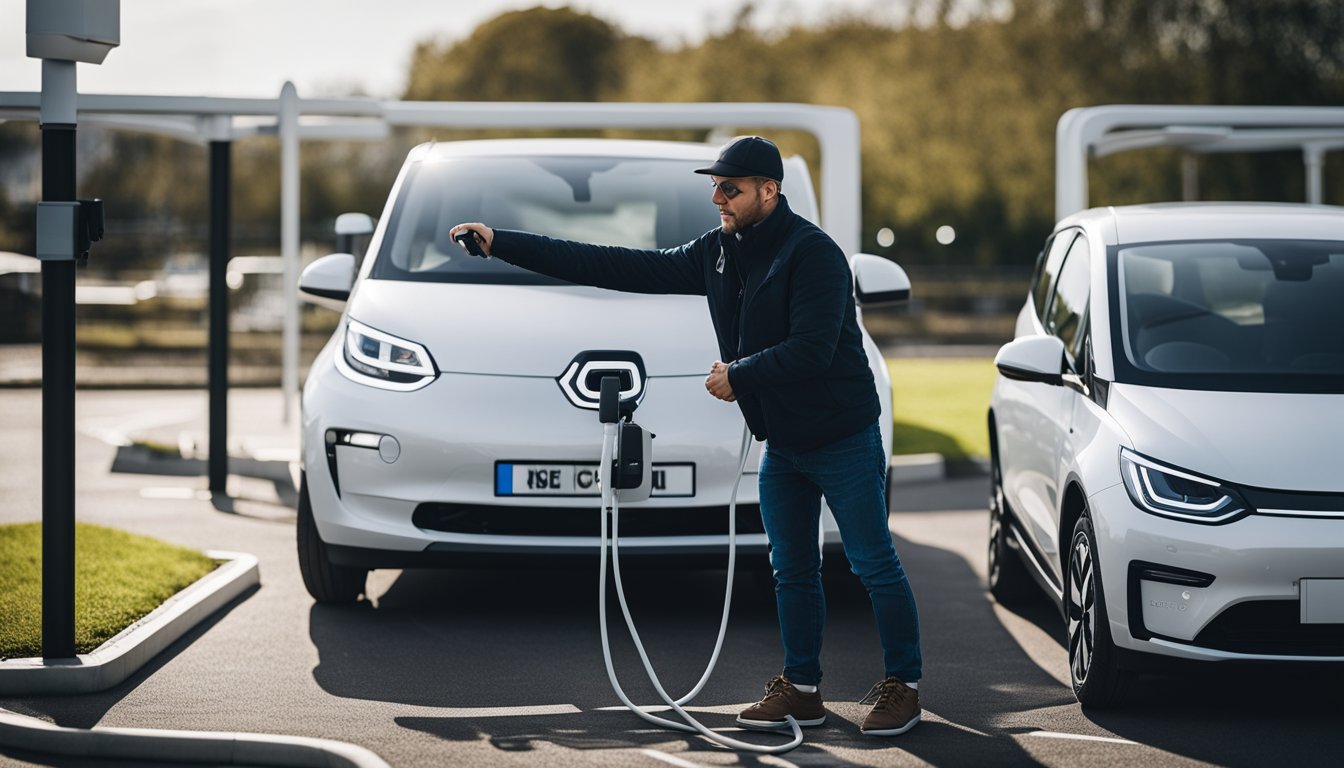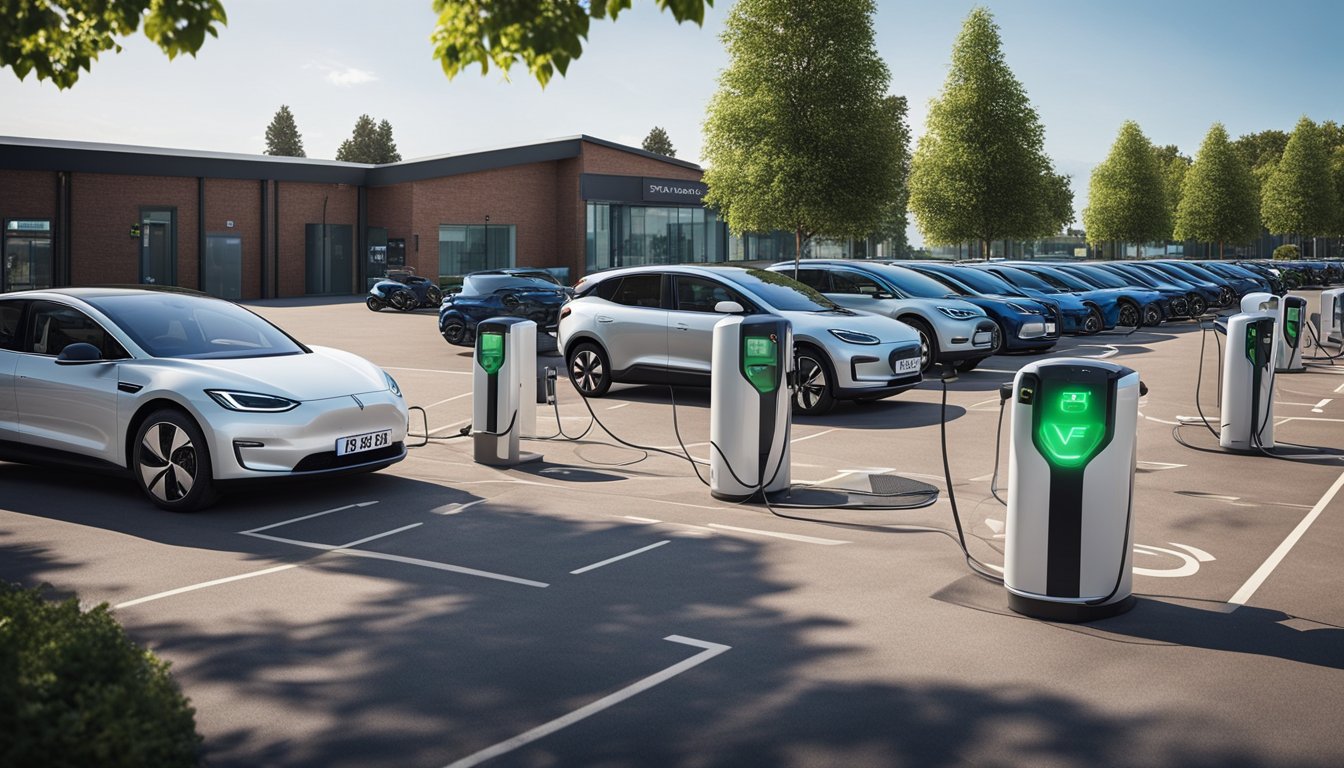Late updated: 16 Nov 2024 13:11
Written by: Amber Collins
Innovative EV Charging Solutions For Small UK Businesses: Boosting Efficiency and Growth
Small businesses in the UK are recognising the shift towards sustainability and the benefits it brings. Innovative EV charging solutions are key to integrating electric vehicles into our business operations effectively. By adopting these technologies, we not only cater to the growing demand for electric vehicles but also align ourselves with a greener future.

As we consider implementing EV charging stations, it’s essential to assess our current infrastructure needs. A tailored approach ensures that our charging solutions are efficient and scalable as our business grows. By working with providers that offer bespoke solutions, we ensure that our investment is future-proof, accommodating a wider range of vehicles and energy demands.
Managing these charging stations requires coordination and planning. We need to focus on the reliability and scalability of solutions to ensure seamless integration into everyday business operations. By leveraging smart technology, we can manage energy use efficiently, thereby reducing costs and enhancing the sustainability of our business.
Key Takeaways
- Effective EV charging solutions align with sustainability goals.
- Assessing infrastructure needs helps tailor suitable charging solutions.
- Managing EV charging stations involves efficient planning and scalability.
Assessing Your Business's EV Infrastructure Needs

To meet the rising demand for electric vehicle charging solutions, small UK businesses must assess their infrastructure needs carefully. These needs can be addressed effectively by conducting site surveys, selecting appropriate commercial EV chargers, and managing energy load efficiently.
Site Survey and Feasibility
Conducting a comprehensive site survey is a crucial first step in evaluating a business's EV infrastructure needs. This process involves assessing the available physical space and existing electrical capacity to determine where and how new charge points can be installed. During the survey, we focus on practical considerations such as proximity to power sources and accessibility for users.
Feasibility studies reveal potential obstacles, such as limited grid connections or high installation costs. By identifying these issues early, we can implement solutions to minimise disruption and ensure efficient charging infrastructure deployment. A well-executed site survey ultimately provides the essential data needed to create a tailored plan for EV infrastructure installations.
Choosing the Right Commercial EV Chargers
Selecting the appropriate commercial EV chargers is vital for any business planning to provide workplace charging. The choice of charger depends on factors like charge speed requirements, expected user volume, and available energy supply. Slow chargers may be suitable for long-term parking situations, while fast chargers cater to quick turnaround needs.
We consider both the hardware capabilities and user interface, ensuring that the selected chargers are user-friendly and compatible with different EV models. Customised solutions may include smart chargers that allow remote monitoring and management via apps, optimising charging schedules based on real-time data and user preferences.
Load Balancing for Optimal Energy Management
Effective load balancing is essential for managing the energy demands of multiple EV chargers while maintaining the overall integrity of the business's electrical supply. Load balancing involves distributing energy use across all available charging points to ensure a stable electrical load.
By implementing load management systems, we can optimise energy consumption and reduce demand charges during peak hours. These systems dynamically allocate power based on current electricity usage, user demand, and grid capacity, thus reducing the risk of overloads. In this way, businesses can achieve a sustainable and cost-effective solution to their electric vehicle charging infrastructure needs.
Implementing and Managing EV Charging Stations
Incorporating efficient EV charging solutions is essential for small UK businesses aiming to optimise their operations and reduce carbon footprints. We explore installation best practices, strategies for fleet charging of business vehicles, and rapid charging adoption for both consumers and staff.
Installation Best Practices
Proper installation of EV charging stations is critical for ensuring operational efficiency and safety. Site assessment is a priority, evaluating available electrical infrastructure and space to accommodate installations. Engaging with qualified professionals can prevent costly errors, ensuring compliance with UK safety standards.
Selecting the right charging equipment depends on the specific business needs, such as the type of electric vehicles expected and the frequency of charging required. We should consider smart and scalable solutions that can grow with our business.
Finally, implementation of smart energy management systems can offer insights into energy use, helping us optimise consumption and potentially reduce costs. This approach supports both sustainability goals and operational efficiency.
Fleet Charging Solutions for Business Vehicles
For businesses deploying electric vehicles, efficient fleet charging is key. Location of charging stations should minimise downtime and ensure that fleet vehicles are always ready. Centralised locations within secure premises typically work best.
Charging management software can streamline operations, scheduling charges during off-peak hours to reduce costs. Real-time monitoring of charging status ensures that potential issues are swiftly addressed, preventing unwanted delays.
Investing in a mixture of standard and rapid chargers can provide flexibility, catering to different operational needs. This allows us to adapt to varying demands, ensuring fleet availability without excessive wait times at charging points.
Adopting Rapid Charging for Consumer and Staff Use
For small businesses, adopting rapid charging solutions can enhance both customer experience and staff efficiency. By providing fast charging options, we can attract more customers and improve employee satisfaction.
Installation of publicly accessible rapid chargers can position our business as forward-thinking and environmentally friendly. This not only supports consumer convenience but encourages more sustainable transportation practices.
Strategically integrating chargers in high-demand areas within the business premises allows staff and visitors to efficiently recharge their vehicles. This can be a key differentiator in a competitive landscape, appealing to eco-conscious customers and helping us achieve our sustainability targets.
Frequently Asked Questions

In this section, we address common concerns for small UK businesses installing EV charging stations, covering installation costs, legal requirements, and the utilisation of government incentives.
What are the key considerations for small UK businesses looking to install EV charging stations?
When installing EV charging stations, businesses must assess their electrical capacity and infrastructure needs. They should also choose appropriate charging technologies that match business operations and customer demands. Site location, power availability, and the potential for future scaling are critical factors. Selecting the right partner for installation and maintenance ensures long-term reliability and support.
How can small businesses in the UK capitalise on government incentives for EV charging infrastructure?
Small businesses can benefit from various UK government incentives, such as grants under the Workplace Charging Scheme. These incentives help offset installation costs. To capitalise on these, companies must meet specific eligibility criteria, including having dedicated off-street parking for the chargers. Staying informed about changes in government policies helps in planning and maximising benefits.
What is the average installation and maintenance cost for EV charging solutions in a small UK business setting?
The average cost for installing EV charging solutions can vary depending on the number of units and site-specific factors. Typically, installation might range between £1,000 and £2,500 per charging point. Maintenance costs are generally lower but can vary based on the technology used and service agreements. It's essential to budget for both initial setup and ongoing maintenance.
How do smart EV charging grids function, and which companies offer these technologies in the UK?
Smart EV charging grids optimise energy distribution, often integrating with renewable sources to manage demand efficiently. They allow for real-time adjustments in charging rates, helping businesses reduce costs and enhance sustainability. Companies like Radius and Shell Recharge offer advanced smart grid solutions and technologies in the UK, providing bespoke options to meet unique business needs.
What are the legal requirements for small businesses installing EV chargers in the UK?
The installation of EV chargers must comply with UK regulations and standards, including obtaining necessary planning permissions if the units will be installed externally. Businesses should ensure chargers meet safety requirements and are certified by recognised bodies. It's important to consult with experts or local authorities to ensure compliance with all applicable laws and standards.
What strategies can small businesses use to ensure the efficiency and accessibility of their EV charging stations?
To maximise efficiency and accessibility, businesses should consider installing charging stations in easily accessible locations with clear signage. Implementing a booking system can manage usage effectively. Regular maintenance ensures chargers remain in good working order. Investing in scalable solutions enables businesses to upgrade and expand their charging facilities as demand grows.
